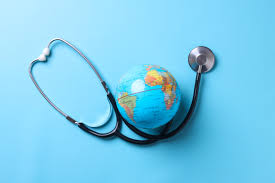Travel Medicine and Global Health Security Training course
Travel Medicine and Global Health Security Training course is designed for health professionals seeking to understand the critical intersection between travel, health risks, and global security.

Course Overview
Travel Medicine and Global Health Security Training course
Travel Medicine and Global Health Security Training course is designed for health professionals seeking to understand the critical intersection between travel, health risks, and global security. This course explores how infectious diseases, environmental factors, and geopolitical issues affect travelers and populations worldwide. Participants will gain insights into the preparation, prevention, and management of health risks associated with travel, ensuring that they can implement effective strategies to protect public health on a global scale.
In an increasingly interconnected world, the importance of travel medicine has never been more pronounced. This course provides a comprehensive overview of travel-related health risks, vaccination protocols, and emergency preparedness. Through interactive workshops, real-world case studies, and practical exercises, attendees will develop the skills necessary to assess risks and provide informed recommendations to travelers, health organizations, and policymakers.
Course Objectives
- Understand the principles of travel medicine and global health security.
- Identify health risks associated with international travel.
- Analyze the impact of infectious diseases on global health.
- Develop vaccination protocols for travelers.
- Implement strategies for disease prevention and health promotion.
- Evaluate health systems' preparedness for travel-related outbreaks.
- Communicate effectively with travelers about health risks.
- Integrate cultural competency into travel health consultations.
- Assess environmental and geopolitical factors affecting health.
- Explore case studies of travel-related health incidents.
- Collaborate with global health organizations for effective interventions.
- Advocate for policies that enhance global health security.
- Prepare for emergency response in travel medicine scenarios.
Target Audience
- Public health professionals
- Travel medicine specialists
- Healthcare providers
- Epidemiologists
- Community health workers
- Policy makers
- Medical students
- Global health researchers
Course Duration: 10 Days
Course Modules
Module 1: Introduction to Travel Medicine
- Overview of travel medicine concepts
- Historical context and significance
- Types of travel-related health risks
- Role of travel medicine in public health
- Current trends and challenges
Module 2: Infectious Diseases in Travel
- Common infectious diseases affecting travelers
- Vaccination recommendations for specific regions
- Prevention strategies for vector-borne diseases
- Case studies of outbreaks related to travel
- Understanding health advisories and alerts
Module 3: Risk Assessment and Management
- Tools for assessing travel health risks
- Developing risk management strategies
- Emergency preparedness for travelers
- Collaborating with local health authorities
- Evaluating health system responses
Module 4: Health Promotion for Travelers
- Educating travelers on health risks
- Creating effective health communication strategies
- Cultural considerations in health promotion
- Engaging communities in health education
- Evaluating the impact of health promotion campaigns
Module 5: Global Health Security Frameworks
- Overview of global health security initiatives
- Role of WHO and other organizations
- National and international health regulations
- Importance of surveillance and response systems
- Case studies of global health security incidents
Module 6: Environmental and Geopolitical Influences
- Impact of environmental factors on health
- Understanding geopolitical risks in travel
- Strategies for managing health in crisis situations
- Engaging with local communities during health crises
- Assessing the role of climate change on health
Module 7: Collaboration and Networking in Travel Health
- Building partnerships with health organizations
- Engaging stakeholders in travel health initiatives
- Effective networking strategies
- Sharing best practices across regions
- Participating in global health forums
Module 8: Future Trends in Travel Medicine
- Emerging health threats in travel
- Innovations in travel health technology
- Research trends in travel medicine
- Policy implications for future travel health
- Preparing for the next global health crisis
Module 9: Pre-Travel Consultations and Screening
- Conducting comprehensive pre-travel health assessments
- Evaluating travelers' medical histories and risk factors
- Prescribing appropriate vaccinations and medications
- Providing tailored pre-travel health advice
- Managing special needs for high-risk travelers
Module 10: Travel-Related Emergencies and Evacuations
- Responding to travel health emergencies
- Managing illness and injury during travel
- Coordinating medical evacuations and repatriations
- Ensuring continuity of care for returning travelers
- Case studies of travel emergency management
Module 11: Occupational Health in the Travel Industry
- Health risks for aviation and maritime workers
- Monitoring crew health during extended travel
- Implementing workplace health promotion programs
- Managing travel-related occupational illnesses
- Ensuring compliance with industry regulations
Module 12: Ethics and Regulations in Travel Medicine
- Ethical considerations in travel health advice
- Navigating legal and regulatory frameworks
- Informed consent and traveler confidentiality
- Access and equity in travel medicine services
- Developing ethical policies and guidelines
- Interactive Workshops: Facilitated discussions, group exercises, and problem-solving activities.
- Practical Demonstrations: Hands-on experience with strategic planning tools and techniques.
- Case Studies: Real-world examples to illustrate effective strategic management practices.
- Role-Playing and Simulations: Practice decision-making in realistic strategic scenarios.
- Expert Presentations: Insights from experienced strategic leaders and consultants.
- Group Projects: Collaborative development of strategic plans for participants' organizations.
- Action Planning: Development of personalized action plans for implementing learned practices.
- Digital Tools and Resources: Utilization of online platforms and applications for strategic management.
- Peer-to-Peer Learning: Pairing experienced managers with those new to strategic planning.